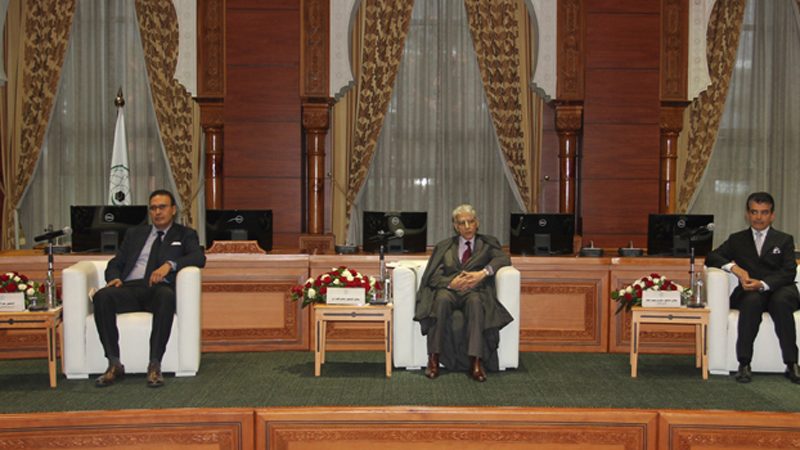
High-level audience and praise for ISESCO Forum

24 October 2019
AlMalik: Investment in culture’s soft power a winning bet at all levels
Jirari: Islamic world open to influential sides in our modern world
Amid a high-level official, academic and media audience, the “ISESCO Cultural Forum” kicked off yesterday at ISESCO headquarters, with a lecture on the topic “Future Cultural Challenges in the Islamic World” by Dr. Abbès Jirari, Advisor to the King of Morocco, Member of the Academy of the Kingdom of Morocco and other Arab scientific and linguistic academies.
Dr. Salim M. AlMalik, ISESCO Director General, opened the forum with a welcoming address wherein he highlighted that the lecture’s topic touches on two issues: the future and culture as a soft power that can, through its impact and influence, be effective instead of being affected.
In this regard, he stated that elites in today’s world have the influence and impact which he described as being the constituent parts of culture, thought, sports and modern arts. “We should be able to invest this soft power in such a way as to serve high interests of the Islamic world, achieve sustainable development, happiness, and prosperity, and ensure security, serenity, stability, harmony, and peace”, Dr. AlMalik maintained.
He added that ISESCO aims, through its new vision that is open to this ever-changing new, to ensure the visibility of the Islamic world in terms of creativity, innovation, globalization and centralization and to the wide human worlds, pointing out that investment in culture’s soft power is a winning bet at all levels.
In addition, ISESCO Director General mentioned that among the persisting issues of the Islamic world there are the questions of identity and coexistence; dissemination of a culture of life, hope and creativity, the fight against the culture of hate, racism and exclusion; and interest in heritage and language issues. He also cited the assertion of the right of culture and access thereto by all citizens; the right of appropriation of modern technology to create new content; and the establishment of a corresponding digital culture that reflects our history, identity, civilization, and historic character, opens to achievements and gains of modern era, and anticipates the future with all determination, self-confidence, resolve and poise.
In the same vein, he said that the lecture of Dr. Abbès Jirari would touch on these issues and provide answers to our questions, given Dr. Jirari’s rich experience, profound knowledge, and long practice in university work, culture, and other disciplines of knowledge.
“The human mind is unique in its creation and the human soul is from one Divine breath. This compels us to share our unity of determination and values to ensure mutual understanding and preserve the dignity of humanity at large”, Dr. AlMalik concluded.
For his part, Dr. Jirari started his lecture by talking about the future cultural challenges in the Islamic world. He stated that the Islamic world boasts of a glorious past marked by excellence in science and arts, maintaining that the West draw on the Islamic civilization and culture to carry the torch of civilization in modern history and arguing that Muslims are required to keep up with today’s changes and carry again the torch of civilization.
“This is a complex equation whose solution lies in the conciliation of authenticity, the source of our pride, with modernity which we try to catch up with. We pride ourselves on our past and history-steeped heritage without bothering to analyze it and rid it of its stains. We need an accurate diagnosis of our heritage and past to separate the wheat from its chaff. We should handle Western modernity -the product of a different environment- from various angles instead of looking at it from the value perspective which constitutes only one side of the equation”, Dr. Jirari noted.
He continued: “We are a nation that values dialogue with the Other. Undoubtedly, education is key to the dissemination of this culture and awareness thereto. Another factor why Muslims value dialogue is the science on which the West founded its progress. Though the Islamic world abounds with universities, the nature of their impact on the society and contribution to solving social issues may be put into question”.
Despite the dominance of Western modernity, Dr. Jirari pointed out, the Islamic world opened up to other dimensions which have become influential today, adding that despite abundance with qualified competencies, the Islamic world does not benefit from such talents as they emigrate to contribute to the prosperity of the Other. He described this situation as a new challenge and asked about ways to get these wasted competencies back to their societies.
In conclusion, Dr. Jirari said that only through culture, consciousness and self-honesty that we can solve our dilemmas and achieve our objectives.
Shortly after the lecture had ended, Dr. Abdelilah Benarafa, Cultural Advisor to ISESCO Director General, the lecture’s moderator, opened the floor for discussion. The participants asked many questions relevant to the topic of the lecture which were all met with positive responses from the lecturer.
The forum was closed with a reception held by ISESCO Director General in honor of Dr. Abbès Jirari, amid the audience’s praises for the success of the Forum.








